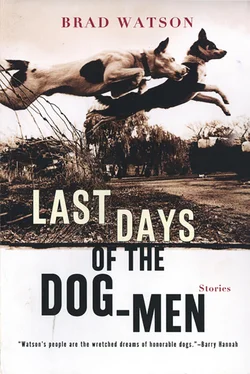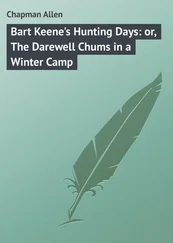HAROLD HIMSELF IS SORT OF LIKE A GARMENT DRAWN from the irregular bin: off-center, unique, a little tilted on his axis. If he were a dog, I’d call him an unbrushed collie who carries himself like a chocolate Lab. He has two actual dogs, a big blond hound named Otis and a bird dog named Ike. Like Phelan, Otis is a socialized dog and gets to come into the house to sleep, whereas Ike must stay outside on the porch. At first I could not understand why Otis received this privilege and Ike did not, but in time I began to see.
Every evening after supper when he is home, Harold gets up from the table and lets in Otis, who sits beside the table and looks at Harold, watching Harold’s hands. Harold’s hands pinching off a last bite of cornbread and nibbling on it, Harold’s hands pulling a Camel cigarette out of the pack, Harold’s hands twiddling with the matches. And soon, as if he isn’t really thinking of it, in the middle of talking about something else and not even seeming to plan to do it, Harold will pick up a piece of meat scrap and let it hover over the plate for a minute, talking, and you’ll see Otis get alert and begin to quiver almost unnoticeably. And then Harold will look at Otis and maybe say, “Otis, stay.” And Otis’s eyes will cut just for a second to Harold’s and then snatch back to the meat scrap, maybe having to chomp his jaws together to suck saliva, his eyes glued to the meat scrap. And then Harold will gently lower the meat scrap onto the top of Otis’s nose and then slowly take away his hand, saying, “Stay. Stay. Stay. Otis. Stay.” Crooning it real softly. And Otis with his eyes cross-eyed looking at the meat scrap on his nose, quivering almost unnoticeably and not daring to move, and then Harold leans back and takes another Camel out of the pack, and if Otis slowly moves just an eighth of an inch, saying, “Otis. Stay.” And then lighting the cigarette and then looking at Otis for a second and then saying, “All right, Otis.” And quicker than you can see it Otis has not so much tossed the scrap up in the air as he has removed his nose from its position, the meat scrap suspended, and before it can begin to respond to gravity Otis has snatched it into his mouth and swallowed it and is looking at Harold’s hands again with the same look as if nothing has happened between them at all and he is hoping for his first scrap.
This is the test, Harold says. If you balance the meat scrap, and in a moment of grace manage to eat the meat scrap, you are in. If you drop the meat scrap and eat it off of the floor, well, you’re no better than a dog. Out you go.
But the thing I was going to tell at first is about Ike, about how when Otis gets let in and Ike doesn’t, Ike starts barking outside the door, big woofing barks, loud complaints, thinking (Harold says), Why is he letting in Otis and not me? Let me IN. IN. And he continues his barking for some couple of minutes or so, and then, without your really being able to put your finger on just how it happens, the bark begins to change, not so much a complaint as a demand, I am IKE, let me IN, because what is lost you see is the memory of Otis having been let in first and that being the reason for complaint. And from there he goes to his more common generic statement, voiced simply because Ike is Ike and needs no reason for saying it, I am IKE, and then it changes in a more noticeable way, just IKE, as he loses contact with his ego, soon just Ike! tapering off, and in a minute it’s just a bark every now and then, just a normal call into the void the way dogs do, yelling HEY every now and then and seeing if anyone responds across the pasture, HEY, and then you hear Ike circle and drop himself onto the porch floorboards just outside the kitchen door. And this, Harold says, is a product of Ike’s consciousness, that before he can even finish barking Ike has forgotten what he’s barking about, so he just lies down and goes to sleep. And this, Harold says, as if the meat scrap test needs corroboration, is why Ike can’t sleep indoors and Otis can.
THE OTHER DAY, HAROLD SAT IN A CHAIR IN FRONT OF HIS bedroom window, leaned back, and put his feet on the sill, and the whole window, frame and all, fell out into the weeds with a crash. I helped him seal the hole with polyethylene sheeting and duct tape and now there’s a filtered effect to the light in the room that’s quite nice on cool late afternoons.
There are clothes in the closets here, we don’t know who they belong to. The front room and the dark attic are crammed with junk. Old space heaters in a pile in one comer, a big wooden canoe (cracked) with paddles, a set of barbells made from truck axles and wheel rims, a seamstress dummy with nipples painted on the breasts, some great old cane fly rods not too limber anymore, a big wooden Motorola radio, a rope ladder, a box of Life magazines, and a big stack of yellow newspapers from Mobile. And lots of other junk too numerous to name.
All four corners of the house slant toward the center, the back of the foyer being the floor’s lowest point. You put a golf ball on the floor at any point in the house and it’ll roll its way eventually, bumping lazily into baseboards and doors and discarded shoes and maybe a baseball mitt or a rolled-up rug slumped against the wall, to that low spot in the tall empty foyer where there’s a power-line spool heaped with wadded old clothes like someone getting ready for a yard sale cleaned out some dresser drawers and disappeared. The doors all misfit their frames, and on gusty mornings I have awakened to the dry tick and skid of dead leaves rolling under the gap at the bottom of the front door and into the foyer, rolling through the rooms like little tumbleweeds, to collect in the kitchen, where then in ones and twos and little groups they skitter out the open door to the backyard and on out across the field. It’s a pleasant way to wake up, really. Sometimes I hang my head over the side of the big bed I use, the one with four rough-barked cedar logs for posts and which Harold said the mice used before I moved in, and I’ll see this big old skink with pink spots on his slick black hide hunting along the crevice between the baseboard and the floor. His head disappears into the crevice, and he draws it out again chewing something, his long lipless jaws chomping down.
The house doors haven’t seen a working lock in thirty or forty years. Harold never really thinks about security, though the bums walking on the road to Florida pass by here all the time and probably used this as a motel before Harold found it out here abandoned on his family’s land and became an expatriate from town because, he says, he never again wants to live anywhere he can’t step out onto the back porch and take a piss day or night.
The night I showed up looking for shelter I just opened up the front door because no one answered and I didn’t know if Harold was way in the back of the big old house (he was) or what. I entered the foyer, and first I heard a clicking sound and Otis came around the corner on his toes, claws tapping, his tail high, with a low growl. And then Harold walked in behind him, his rusty old.38 in his hand. He sleeps with it on a bookshelf not far from his bed, the one cheap bullet he owns next to the gun if it hasn’t rolled off onto the floor.
The night that Phelan arrived to stay, fell through the door onto his back, and lay there looking up into the shadows of the high old foyer, Otis came clicking in and approached him slowly, hackles raised, lips curling fluidly against his old teeth, until his nose was just over Phelan’s. And then he jumped back barking savagely when Phelan burst out like some slurring old thespian, “There plucking at his throat a great black beast shaped like a hound, ‘The Hound!’ cried Holmes, ‘Great Heavens!’ half animal half demon, its eyes aglow its muzzles and hackles and dewlap outlined in flickering flame.”
Читать дальше











